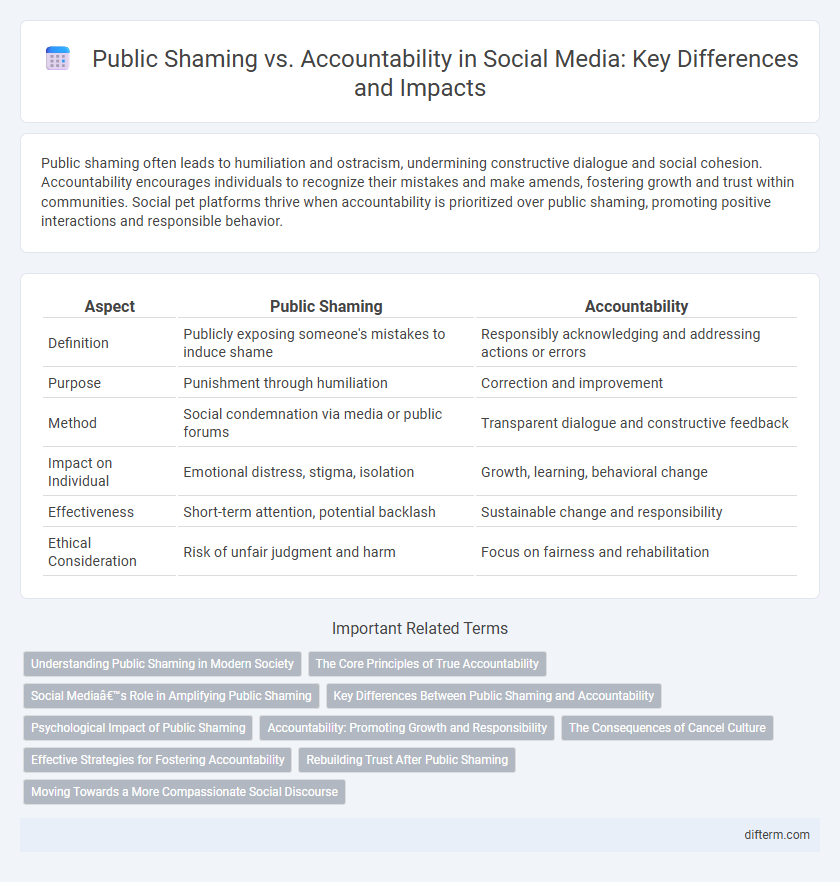Public shaming often leads to humiliation and ostracism, undermining constructive dialogue and social cohesion. Accountability encourages individuals to recognize their mistakes and make amends, fostering growth and trust within communities. Social pet platforms thrive when accountability is prioritized over public shaming, promoting positive interactions and responsible behavior.
Table of Comparison
| Aspect | Public Shaming | Accountability |
|---|---|---|
| Definition | Publicly exposing someone's mistakes to induce shame | Responsibly acknowledging and addressing actions or errors |
| Purpose | Punishment through humiliation | Correction and improvement |
| Method | Social condemnation via media or public forums | Transparent dialogue and constructive feedback |
| Impact on Individual | Emotional distress, stigma, isolation | Growth, learning, behavioral change |
| Effectiveness | Short-term attention, potential backlash | Sustainable change and responsibility |
| Ethical Consideration | Risk of unfair judgment and harm | Focus on fairness and rehabilitation |
Understanding Public Shaming in Modern Society
Public shaming in modern society often blurs the line between accountability and humiliation, making it crucial to discern the intent and impact of online critiques. Social media platforms amplify public shaming, causing widespread psychological harm while sometimes promoting social justice by holding individuals accountable. Understanding this balance helps foster constructive dialogue and protects mental health without undermining genuine accountability efforts.
The Core Principles of True Accountability
True accountability centers on transparency, responsibility, and restorative actions rather than public shaming, which often prioritizes humiliation over growth. Core principles include acknowledging mistakes honestly, committing to corrective measures, and fostering open dialogue that promotes learning and reconciliation. This approach builds trust and encourages constructive change without resorting to harmful social penalties.
Social Media’s Role in Amplifying Public Shaming
Social media platforms drastically amplify public shaming by enabling rapid dissemination and widespread visibility of personal mistakes or controversial actions. The viral nature of posts, comments, and hashtags creates a collective environment where individuals face intense scrutiny, often leading to disproportionate backlash and reputational damage. Algorithms prioritize sensational content, intensifying emotional responses and minimizing nuanced discussions about accountability and growth.
Key Differences Between Public Shaming and Accountability
Public shaming often involves exposing individuals to widespread criticism or ridicule, focusing on punishment rather than growth, while accountability emphasizes taking responsibility and learning from mistakes to foster improvement. Public shaming can lead to lasting damage to reputation and mental health, whereas accountability supports constructive dialogue and restoration of trust. Key differences include intent, impact, and the opportunity for redemption.
Psychological Impact of Public Shaming
Public shaming can cause intense psychological distress, leading to anxiety, depression, and social withdrawal that often outlasts the initial incident. Unlike accountability, which aims to promote learning and growth, public shaming tends to inflict lasting damage on an individual's self-worth and mental health. Studies reveal that the fear of public humiliation can create trauma, impede rehabilitation, and even contribute to suicidal ideation.
Accountability: Promoting Growth and Responsibility
Accountability fosters personal growth by encouraging individuals to take responsibility for their actions and learn from mistakes, creating a foundation for positive change. Emphasizing accountability over public shaming cultivates trust, strengthens relationships, and supports a culture of empathy and constructive feedback. This approach promotes resilience and long-term development, enabling communities to thrive through mutual understanding and respect.
The Consequences of Cancel Culture
Public shaming through cancel culture often leads to disproportionate social and professional consequences that extend beyond the original offense. This phenomenon can undermine true accountability by prioritizing punishment over dialogue, resulting in reputational damage, mental health issues, and social ostracization. Studies show that while cancel culture aims to enforce social norms, it may also discourage individuals from constructive engagement and personal growth.
Effective Strategies for Fostering Accountability
Effective strategies for fostering accountability emphasize clear communication of expectations, consistent enforcement of consequences, and creating a culture of transparency and support. Encouraging open dialogue and restorative practices helps individuals understand the impact of their actions and promotes personal growth. Leveraging community engagement and feedback mechanisms strengthens collective responsibility without resorting to public shaming.
Rebuilding Trust After Public Shaming
Rebuilding trust after public shaming requires consistent transparency and genuine accountability from the individual or organization involved. Demonstrating meaningful change through actions, such as public apologies and corrective measures, helps restore credibility and fosters community forgiveness. Engaging openly with affected parties and maintaining honest communication are essential steps in repairing reputational damage and reestablishing mutual respect.
Moving Towards a More Compassionate Social Discourse
Public shaming often amplifies harm by fostering fear and division rather than encouraging growth or understanding. Emphasizing accountability through empathy allows for constructive dialogue and genuine behavioral change. Cultivating a culture of compassion in social discourse promotes healing and strengthens communal bonds.
public shaming vs accountability Infographic

 difterm.com
difterm.com